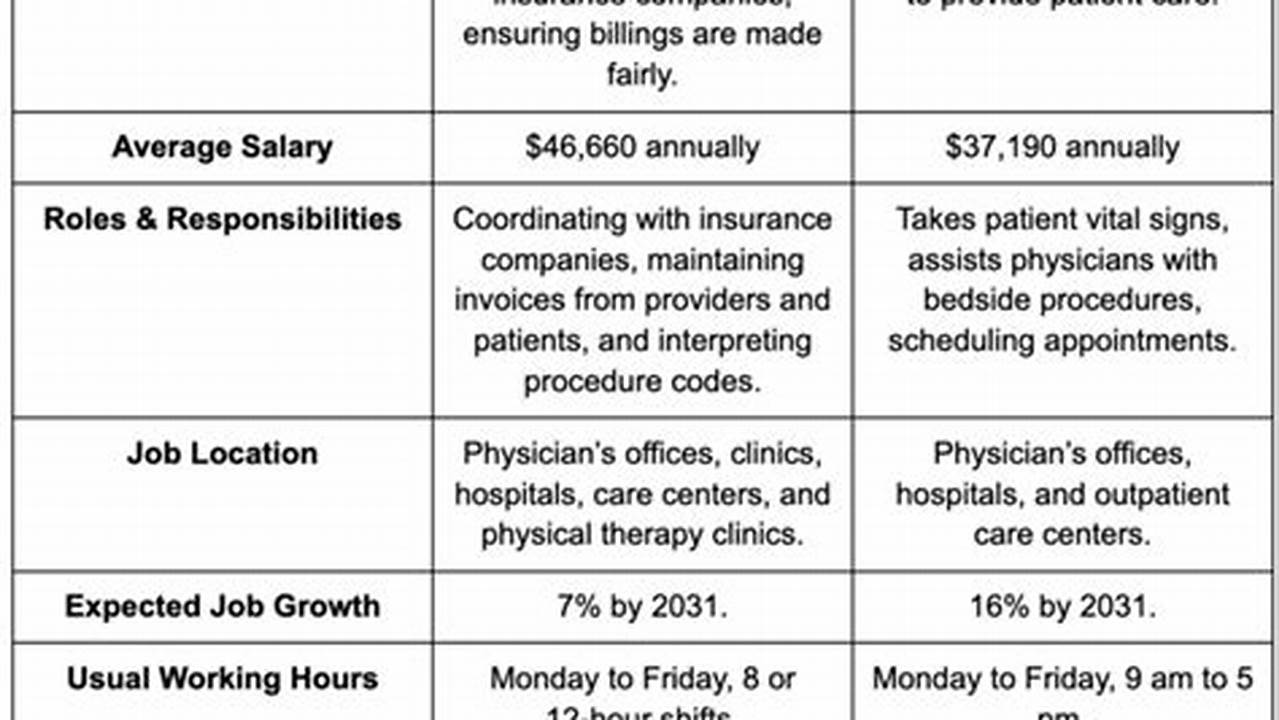Medical Billing and Coding vs Medical Administrative Assistant Roles

Jeannedarcherblay.com Hi I hope everyone is healthy and well. In This Time I want to share tips and tricks about Medical, Billing. Informative Notes About Medical, Billing Medical Billing and Coding vs Medical Administrative Assistant Roles Always follow the discussion until the end.
Medical Billing and Coding vs Medical Administrative Assistant Roles
In the ever-evolving healthcare industry, medical billing and coding professionals and medical administrative assistants play critical roles. While both positions are essential for the smooth operation of healthcare facilities, their responsibilities, skills, and career paths differ significantly.
Details
Medical Billing and Coding
Medical billing and coding professionals are responsible for processing and managing patient billing, ensuring accurate insurance claims, and maintaining financial records for healthcare organizations. They use medical codes to translate patient diagnoses, procedures, and services into standardized formats required by insurance companies. Their key responsibilities include:
- Assigning medical codes to patient records
- Processing insurance claims
- Following up on unpaid claims
- Reviewing patient accounts for accuracy
- Resolving billing disputes
- Maintaining patient financial records
Medical Administrative Assistant
Medical administrative assistants provide administrative and clerical support to healthcare professionals and medical facilities. They handle a wide range of tasks, including scheduling appointments, managing patient records, processing insurance forms, and providing general administrative assistance. Their key responsibilities include:
- Scheduling patient appointments
- Maintaining patient records
- Processing insurance forms
- Answering phones and emails
- Providing customer service to patients
- Performing general office tasks
FAQ Section
What is the average salary for a medical billing and coding professional?
According to the Bureau of Labor Statistics (BLS), the median annual salary for medical billing and coding professionals was $43,640 in May 2021.
What are the educational requirements for becoming a medical billing and coding professional?
Most medical billing and coding professionals hold an associate's degree or certificate in medical billing and coding. Some employers may also require certification from a recognized organization such as the American Health Information Management Association (AHIMA).
What is the average salary for a medical administrative assistant?
According to the BLS, the median annual salary for medical administrative assistants was $37,210 in May 2021.
What are the educational requirements for becoming a medical administrative assistant?
Most medical administrative assistants hold a high school diploma or equivalent and may have completed additional training or certification programs.
Which role has a higher demand in the job market?
Both medical billing and coding professionals and medical administrative assistants are in high demand in the job market due to the increasing need for healthcare services.
Which role is more challenging?
The level of challenge in each role depends on the specific responsibilities and the organization's size and complexity. Medical billing and coding professionals typically handle more complex tasks and must stay up-to-date on medical codes and regulations.
Which role offers better career advancement opportunities?
Both roles offer career advancement opportunities with experience and additional training or education. Medical administrative assistants may advance to roles such as office manager or practice manager. Medical billing and coding professionals may advance to roles such as medical records manager or healthcare administrator.
Which role is more suited for someone with a strong attention to detail?
Both medical billing and coding professionals and medical administrative assistants require strong attention to detail to ensure accuracy in their work.
Pros Section
Pros of working as a medical billing and coding professional:- High demand for qualified professionals
- Opportunity to work in various healthcare settings
- Job security due to the essential nature of their role
- Career advancement opportunities with additional training or education
- Opportunities to work remotely
- Entry-level position with minimal education requirements
- Opportunities to interact with patients and make a direct impact on their care
- Job stability in the healthcare industry
- Opportunities to learn about the healthcare field and advance to other roles
- Flexibility to work in various healthcare settings
Tips Section
Tips for becoming a certified medical billing and coding professional:- Earn an associate's degree or certificate in medical billing and coding
- Become certified by a recognized organization such as AHIMA
- Stay up-to-date on medical codes and regulations
- Gain experience in a healthcare setting
- Network with other professionals in the field
- Obtain a high school diploma or equivalent
- Complete additional training or certification programs
- Develop strong organizational and communication skills
- Gain experience in a healthcare setting
- Network with other professionals in the field
Summary
Medical billing and coding professionals and medical administrative assistants play vital roles in the healthcare industry. While both positions require attention to detail and strong organizational skills, medical billing and coding professionals focus on patient billing and coding, while medical administrative assistants provide general administrative and clerical support.
Medical Billing and Coding vs Medical Administrative Assistant: What is the Difference?
Medical Billing and Coding vs Medical Administrative Assistant
Medical billing and coding professionals focus on patient billing and coding, while medical administrative assistants provide general administrative and clerical support.
Medical billing and coding professionals are responsible for processing and managing patient billing, ensuring accurate insurance claims, and maintaining financial records for healthcare organizations. They use medical codes to translate patient diagnoses, procedures, and services into standardized formats required by insurance companies.
What are the Key Responsibilities of a Medical Administrative Assistant?
Medical administrative assistants provide administrative and clerical support to healthcare professionals and medical facilities. Their key responsibilities include scheduling appointments, managing patient records, processing insurance forms, and providing general administrative assistance.











